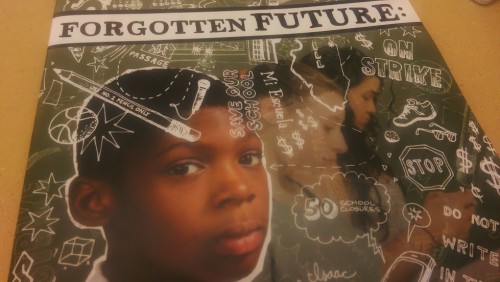
Forgotten Future: The Education Project at COLLABORACTION
I recently went to see, “Forgotten Future: The Education Project” at the Collaboraction theater space. The set up was an immersive theater experience, if not a slightly interactive one, outlining the troubles of the Chicago Public School system, and the broader arena of public schools nationally. The dichotomy of strife between public schools seems to be put in stark contrast by two lines, “There was blood and casings still on the pavement,” says the character Mrs. Tate (played by Ebony Joy), and another from a star overstressed student, “Northside is the best, and I have to go to the best,” exclaims Lauren Perry (played by Leah Aberman, a 7th-grader at Lane Tech Academic Center). The intricacies of the public school system’s failings and successes are outlined artfully with a combination of projected information, a straightforward and well-executed classroom style set, and inspired performances.
Written by Sarah Moeller, with co-writing credits by Adam Seidel & Michele Stine, “Forgotten Future” may come off heavy at times, but it’s fitting for the weight of the subject matter. “Forgotten Future” doesn’t pull punches, and it’s factually and emotionally accurate. I worked in CPS for a very brief time as part of a competitive alternative teaching certification program. I ran into a lot of difficulty, and ultimately had to step out due to a health concern. A number of moments in the show struck a chord with me, and felt true to life, and some of the lines devastated me. Ultimately it’s a necessary experiment in theater, documenting the complexities of the CPS education system in a fair, nuanced, and sometimes appropriately harsh light.
Moeller is an educator as well as theater artist. She felt that “Forgotten Future” fit perfectly within Collaboraction’s mission of exploring “critical social issues.” Moeller emphasizes the clarion call, “Children are the future. They are our future. They are the people that will run the world when we are old. I think it is important to bring the crisis that is the school system to the attention of the public and call for action in order to incite social change.” In times of great economic distress it’s easy to forget that education, training, the ability to adapt and learn are among the most important skills that our still growing nation can learn, and lately it seems that education has been first on the chopping block.
[youtube]http://youtu.be/_b4chk53Sfc[/youtube]
The research process for the show was intensive and took place over a number of months. “We interviewed 100’s of teachers, students, parents and community members to collect the stories seen on stage,” Moeller says. “Every part of the show is based on fact from the interviews and other research.” It shows; the detail of information is as impactful as the performances. Which is not to say that the performances themselves aren’t impactful, because they truly are.
Scott Merchant, played Mr. Wright in the piece, and hopes that the performance will have influence beyond the walls of the theater, “If we can make individuals go to a polling place who otherwise wouldn’t, that’s a win,” Merchant says. “If we can encourage those who don’t have kids in CPS to believe that it’s important to care about local education, that’s a win. If this show makes someone write a letter to demand what they become passionate about, that’s a win.”
And while the struggles for education will continue, hopefully this show will bring to light in a tangible and useable way some of the struggles that the individuals within education are facing: the struggles of the students, teachers, parents, and community members involved. “The reaction from educators and students has been powerful,” Moeller says. “It is an incredible experience to be in an audience with educators and students. They have such a visceral reaction because the material is so much like their own experiences. Throughout the creation process and now that we are in production teachers have expressed that they are incredibly happy we are tackling this topic and bringing it to the spotlight.”
At the end of the play, the young character Isaac Tate (Tyrese Hall, a 6th-grader at Alain Locke Charter School), gives a speech, presumably before the board of education. He seems to be addressing the film “Searching for Superman,” outlining why he admires comic book characters. He gives his personal journey as a student and concludes that, “We each have to be our own superhero.”
The play ultimately highlights the product of a perfect marriage of process and artistic result. The play balances the true and the dramatic, while being ever faithful to the facts, and this is a victory not only of direction and collaboration, but also of a keen vision for a theater that deserves to thrive for a long, long time.

